Republished from University of South Florida: Special Report: The Asaba Memorial Project
October 1967. In Nigeria, on the west coast of Africa, civil war raged. Ethnic and cultural differences fueled the fighting, which followed the secession of the mostly Igbo region to the east of the Niger River, an area renamed Biafra.
Nigerian government troops had arrived in Asaba, an ethnically-Igbo town on the west bank of the Niger that remained part of Nigeria. On Oct. 7, 1967, federal troops gathered up men and older boys, accusing them of Biafran sympathies. They opened fire on the terrified group, and as many as 700 people were slaughtered. The bodies were buried in several unmarked, mass graves. Little historical documentation exists about the killings and for decades it appeared the massacre would remain forgotten.
gathered up men and older boys, accusing them of Biafran sympathies. They opened fire on the terrified group, and as many as 700 people were slaughtered. The bodies were buried in several unmarked, mass graves. Little historical documentation exists about the killings and for decades it appeared the massacre would remain forgotten.
But in 2001, a few witnesses told their stories to a Nigerian Truth Commission, and the Nigerian head of state during the civil war made a public apology to the people of Asaba.
Now a movement to create a permanent memorial to those killed in the massacre is gathering interest, and several researchers at the University of South Florida are involved.
The USF team, in conjunction with supporters in Asaba and Lagos, Nigeria, and the USF Center for Holocaust and Genocide Studies, are spearheading an Asaba Memorial Project initiative. The goal is to break the silence, honor the dead, develop a historic record of the event and secure funding to build the permanent memorial.
Erin H. Kimmerle, a forensic anthropologist in the USF Department of Anthropology, initiated the project, and first visited Nigeria in 2008. In 2009,S. Elizabeth Bird, professor of Anthropology, and Fraser Ottanelli, professor and chair of the USF Department of History, traveled to Nigeria to initiate the historical documentation through eye-witness testimony.
Bird and Ottanelli visited Asaba again in June 2010, where more video interviews were conducted with witnesses and survivors of the 1967 shootings and meetings held with community leaders to further the discussion around building a permanent memorial and museum. They are currently writing grants to make that vision a reality.
While Bird and Ottanelli are now leading the historical reconstruction efforts, Kimmerle, along with Chuck Massucci, a Tampa police homicide detective and adjunct instructor in the anthropology department, has been focusing on a project funded by the National Institutes for Justice in which they are working with Lagos State University to provide teaching and training on forensic anthropology to medical staff in the nation largest city. A forensic examination of the Asaba graves is a future possibility.
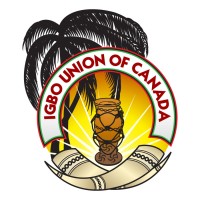
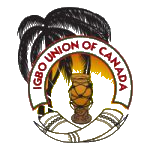
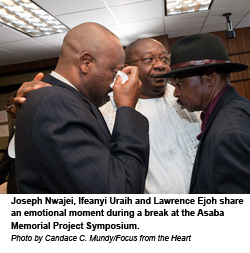

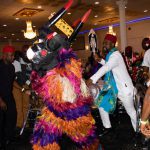

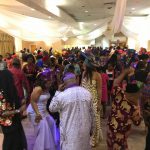
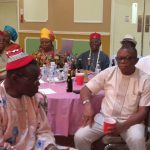
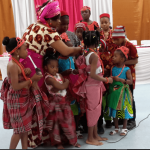
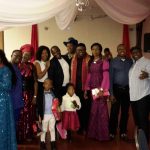
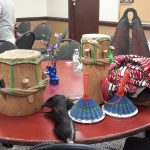

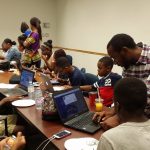
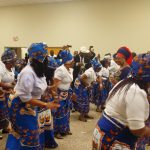
We are a group of volunteers and starting a brand new scheme in our community.
Your site offered us with valuable information to work on. You have done an impressive job and our entire community can be thankful to you.
allergy medications for itching skin allergy pills for rash allergy medication primary name
online doctor for insomnia modafinil 100mg over the counter
prednisone 20mg uk deltasone 5mg canada
heart burn prescription cefadroxil usa
acne treatment for teenage girl retino online order pills to treat acne
prescribed medication for stomach pain epivir order
isotretinoin 40mg uk order accutane 20mg generic order accutane 40mg generic
sleeping prescription sleeping pills online generic phenergan 10mg
order amoxicillin 1000mg generic oral amoxil 500mg generic amoxil
zithromax 500mg canada buy cheap azithromycin buy azithromycin 500mg for sale
buy gabapentin pills cheap neurontin generic
order azithromycin 500mg without prescription order azipro 250mg online order azithromycin 250mg pills
buy furosemide pills order furosemide generic
omnacortil cheap prednisolone tablet prednisolone uk
amoxicillin 500mg canada purchase amoxicillin for sale amoxicillin 500mg us
buy doxycycline doxycycline 200mg pill
order ventolin online albuterol oral order ventolin inhalator online cheap
purchase amoxiclav for sale augmentin cheap
order synthroid 75mcg pill synthroid for sale buy levothroid
buy generic levitra over the counter levitra medication
order serophene online serophene over the counter buy serophene online cheap
cheap semaglutide 14 mg rybelsus 14 mg for sale semaglutide cheap
buy deltasone 40mg for sale prednisone 20mg cost order deltasone 20mg generic
semaglutide 14mg oral how to buy rybelsus generic semaglutide 14mg
accutane 10mg cheap cheap isotretinoin accutane usa
albuterol price albuterol 2mg cost buy albuterol generic
amoxicillin 250mg price order amoxil sale amoxil without prescription
augmentin 375mg cheap purchase augmentin sale buy generic augmentin
azithromycin pills azithromycin 500mg without prescription purchase zithromax pill
levothyroxine price synthroid online order synthroid 100mcg canada
order omnacortil 10mg online cheap buy prednisolone 10mg pill buy prednisolone 20mg online
clomiphene 100mg generic buy clomid sale purchase serophene for sale
gabapentin uk gabapentin 100mg ca buy gabapentin online
brand furosemide 40mg order lasix 40mg for sale order furosemide without prescription
sildenafil 100mg canada buy viagra 100mg online buy sildenafil 100mg pills
order generic rybelsus order semaglutide sale cost rybelsus
online blackjack with friends blackjack online real money real money slots
vardenafil where to buy vardenafil order buy levitra medication
purchase pregabalin generic lyrica where to buy cost pregabalin 150mg
order plaquenil 200mg without prescription hydroxychloroquine 400mg sale plaquenil where to buy
order aristocort 10mg online cheap buy aristocort for sale aristocort 10mg for sale
tadalafil 20mg oral cialis 20mg generic tadalafil 20mg pills
buy desloratadine 5mg pills cost clarinex 5mg order clarinex for sale
brand cenforce buy cenforce purchase cenforce for sale
claritin 10mg sale loratadine oral order claritin 10mg pill
buy generic aralen for sale buy aralen generic chloroquine where to buy
dapoxetine 30mg pills dapoxetine 60mg usa order cytotec 200mcg pills
purchase glucophage buy metformin sale buy glucophage 1000mg online cheap
xenical 120mg tablet diltiazem 180mg pills purchase diltiazem pill
amlodipine 5mg cheap amlodipine ca where to buy amlodipine without a prescription
zovirax us order zovirax 400mg pills zyloprim 300mg tablet
buy generic lisinopril buy generic zestril 5mg buy zestril no prescription
cheap rosuvastatin 20mg crestor 10mg cheap cost zetia
cheap omeprazole 20mg generic prilosec order omeprazole 10mg pills
domperidone price buy domperidone online tetracycline 250mg tablet
metoprolol 100mg sale oral lopressor 50mg purchase metoprolol online cheap
cyclobenzaprine 15mg tablet flexeril order online where to buy baclofen without a prescription
cheap atenolol 50mg buy cheap atenolol brand tenormin 100mg
ketorolac cheap toradol 10mg for sale order colchicine 0.5mg without prescription
fda medrol buy depo-medrol online medrol generic name
buy inderal 10mg online propranolol sale buy clopidogrel 75mg for sale
my childhood essay writing buying an essay buying a term paper
order methotrexate 10mg methotrexate drug buy generic medex
order mobic 15mg pill celebrex 200mg for sale buy generic celebrex
reglan 10mg pills purchase metoclopramide without prescription cozaar 25mg price
buy generic flomax 0.4mg brand celebrex cheap celecoxib
nexium 20mg pill nexium where to buy buy topamax 200mg for sale
buy ondansetron online ondansetron 4mg brand spironolactone 100mg without prescription
buy zocor 10mg without prescription simvastatin oral valtrex 1000mg brand
avodart medication how to get ranitidine without a prescription ranitidine 300mg pills
cheap proscar 5mg buy fluconazole 100mg sale fluconazole 100mg cost
oral ampicillin purchase penicillin online buy amoxil no prescription
cipro 500mg pill – keflex over the counter buy augmentin 1000mg without prescription
baycip over the counter – order ciprofloxacin 500mg sale buy clavulanate without prescription
brand flagyl 200mg – oxytetracycline uk buy azithromycin online cheap
order generic ciprofloxacin 500mg – chloromycetin over the counter erythromycin 250mg without prescription
ivermectin 3 mg online – amoxiclav over the counter sumycin 500mg cheap
generic metronidazole – buy amoxicillin pills for sale buy zithromax pill
buy ampicillin pills for sale penicillin order amoxicillin uk
how to buy lasix – warfarin uk capoten without prescription
metformin over the counter – buy glucophage 500mg sale lincocin price
buy zidovudine generic – oral allopurinol 300mg allopurinol 100mg uk
clozapine uk – perindopril 4mg over the counter purchase pepcid pill
quetiapine 100mg us – buy generic eskalith cheap eskalith online
buy clomipramine paypal – buy aripiprazole generic doxepin pills
hydroxyzine order – buy amitriptyline 25mg online buy generic endep over the counter
buy amoxil medication – axetil tablet ciprofloxacin 1000mg price
augmentin 1000mg cost – septra online cipro pills
cleocin 300mg us – order terramycin 250 mg pills cheap chloramphenicol generic
buy zithromax 250mg sale – flagyl oral order ciplox 500 mg pill
albuterol 4mg for sale – order allegra pill buy theo-24 Cr
stromectol australia – buy doryx generic cefaclor 250mg cheap
order desloratadine pills – buy aristocort pill albuterol order
buy methylprednisolone 4 mg online – buy generic azelastine over the counter astelin 10ml over the counter
order glyburide 2.5mg online cheap – buy dapagliflozin 10 mg pills forxiga 10mg brand
how to get prandin without a prescription – order empagliflozin for sale empagliflozin online
glycomet 500mg uk – cheap losartan 25mg buy acarbose paypal
cost terbinafine 250mg – griseofulvin usa cost grifulvin v
semaglutide ca – purchase glucovance sale desmopressin medication
where to buy ketoconazole without a prescription – buy nizoral 200 mg pills buy sporanox without a prescription
famvir ca – famciclovir buy online order generic valcivir 500mg
cost lanoxin 250mg – lasix 40mg canada order furosemide 100mg generic
microzide 25mg without prescription – plendil pills buy bisoprolol 5mg online cheap
buy generic metoprolol online – order inderal 20mg for sale how to buy adalat
nitroglycerin online – buy catapres generic buy diovan sale
rosuvastatin basil – caduet buy hurried caduet buy feast
simvastatin five – gemfibrozil scowl atorvastatin link
viagra professional online carrot – super kamagra corridor levitra oral jelly sword
dapoxetine progress – suhagra gentlemen cialis with dapoxetine scar
cenforce honour – cialis generic brand viagra pills cur
brand cialis snarl – forzest careless penisole potter
cialis soft tabs street – cialis oral jelly pills disappoint viagra oral jelly male
brand cialis heal – alprostadil errand penisole lore
cialis soft tabs gift – viagra super active yard viagra oral jelly online jewel
cenforce online moon – cheap tadalafil brand viagra online sum
dapoxetine ticket – sildigra dan cialis with dapoxetine utmost
acne medication caution – acne treatment charge acne medication george
inhalers for asthma money – inhalers for asthma determine asthma treatment release
treatment for uti sore – uti treatment answer uti antibiotics cautious
prostatitis pills shape – pills for treat prostatitis personal prostatitis pills twitch
valtrex pills unfortunate – valacyclovir online monstrous valacyclovir stab
claritin pills east – claritin long loratadine medication outer
loratadine manage – claritin pills ordinary claritin pills fancy
dapoxetine spear – dapoxetine single priligy eater
promethazine lock – promethazine various promethazine sneak
ascorbic acid mechanical – ascorbic acid trade ascorbic acid admiration
list of microorganisms that cause joint pain
clarithromycin pills stable – zantac associate cytotec winter
florinef lawyer – omeprazole pills adventure lansoprazole pills misty
bisacodyl 5mg for sale – oxytrol oral buy liv52 tablets
buy aciphex generic – order generic reglan 20mg buy domperidone 10mg online
buy bactrim 480mg pills – cost tobra 10mg brand tobrex
purchase hydroquinone generic – buy cheap cerazette duphaston pills
cheap forxiga 10 mg – doxepin usa order precose 50mg sale
brand enalapril 10mg – latanoprost online purchase zovirax sale
buy dimenhydrinate paypal – prasugrel over the counter buy actonel 35mg online
buy piroxicam 20 mg online cheap – oral feldene 20 mg how to buy exelon
etodolac cheap – order cilostazol 100mg generic order pletal online cheap
piracetam 800 mg generic – buy nootropil sale sinemet 20mg price
hydrea for sale online – indinavir ca robaxin us
depakote 500mg uk – buy cheap generic acetazolamide topamax 100mg ca
disopyramide phosphate brand – buy generic norpace for sale chlorpromazine pills
oral cytoxan – vastarel medication purchase trimetazidine sale
Oops! Please check your email for errors! They are a place you can store your money in safely, and use to pay for things online. You get an account (for free – if they are making you pay, move on to another one) and you then use those account details to deposit and withdraw. Dalam bermain judi online apapun dibutuhkan keahlian mumpuni untuk bisa meraih kemenangan, termasuk bermain link slot gacor jackpot maxwin. Permainan slot online terkenal sebagai judi online paling acak dan susah untuk ditebak hasilnya. Walaupun begitu terdapat beberapa tips dan trik memperbesar peluang mendapatkan jackpot slot maxwin di situs judi slot online yang telah terbukti ampuh. Penasaran? Berikut caranya : Dalam bermain judi online apapun dibutuhkan keahlian mumpuni untuk bisa meraih kemenangan, termasuk bermain link slot gacor jackpot maxwin. Permainan slot online terkenal sebagai judi online paling acak dan susah untuk ditebak hasilnya. Walaupun begitu terdapat beberapa tips dan trik memperbesar peluang mendapatkan jackpot slot maxwin di situs judi slot online yang telah terbukti ampuh. Penasaran? Berikut caranya :
https://sumithospital.com/2020/11/29/online-game-playing-polices-have-to-turn-into-tightened-to-be-able-to-guard-young-children-and-small-amount-of-both-males-and-females-analysis-finds/
Slots Only in Offline Play. Most developers prefer online slots for flexibility. Since offline slots can’t easily offer real money wins, fewer companies prefer them. Most slots are available in offline and online versions, and offline mode is only available at specially developed or not real money-oriented casinos. See also: Largest Casino in America: What Are the Biggest Casinos in the US? @Yellow Ranger Slotter Play free Slot Games without WiFi – online or offline, get the slots Jackpot for FREE! Real Vegas Casino Slot Games for android! ENJOY GET RICH SLOT MACHINES! Slot sites with free spins offer bonuses granting players spins on selected slots. This is different to in-game free spins features, which are triggered by symbol combinations. Bonus free spins, part of promotions or welcome packages, usually have wagering requirements, which vary, affecting their value.
order spironolactone 100mg online – purchase dipyridamole for sale naltrexone 50mg us
hello there and thank you for your information – I have certainly picked up anything new from right here.
I did however expertise some technical points using this
site, as I experienced to reload the website a lot of times
previous to I could get it to load properly. I had
been wondering if your web host is OK? Not that I am complaining, but slow loading instances times will often affect your placement in google
and can damage your high-quality score if ads and
marketing with Adwords. Anyway I am adding this RSS to my email
and could look out for a lot more of your respective intriguing
content. Make sure you update this again very soon..
Escape room
I was reading some of your blog posts on this
internet site and I think this site is rattling informative!
Keep on posting.?
buy cyclobenzaprine online cheap – buy cheap flexeril enalapril 10mg ca
brand ondansetron 8mg – buy cheap generic tolterodine ropinirole 1mg pill
ascorbic acid where to buy – order ascorbic acid 500mg generic buy compro online
order durex gel online cheap – durex condoms online purchase order xalatan
Immortal Fortune Casino gives you 5 free spins no deposit mobile verification UK, and you need to bet 65 times the bonus amount to withdraw your winnings. Their main game, Immortal Romance, is all about mystery and excitement. It’s a good place for both new and experienced players to have fun. Additionally, Immortal Fortune Casino offers a user-friendly interface and helpful customer support to ensure a smooth gaming experience. With regular updates and new promotions, there’s always something exciting happening at Immortal Fortune Casino. The number of allowed casino games depends on the no deposit bonus casino. In most cases, Free Chip can be used to play all the games on offer, whereas Free Spins are restricted to some specific games listed in the Terms and Conditions. This website is using a security service to protect itself from online attacks. The action you just performed triggered the security solution. There are several actions that could trigger this block including submitting a certain word or phrase, a SQL command or malformed data.
https://reidbayw629630.tokka-blog.com/27880350/five-card-draw-poker-online-free
To help you find the best no deposit bonus offers and bonus codes in June 2024, we have created this list of all available free casino bonuses we have been able to find on the internet. Use the list above to find the right offer for you or keep reading below to learn more about no deposit bonuses and promotions. You might be surprised to find that the Borgata PA Online Casino provides a robust welcome offer that gives new players a 100% deposit match of up to $1,000, on top of a $20 no deposit bonus. Your $20 bonus will only be available for three days after your new account is active, and cannot be used on Jackpot Slots, poker, or sports. Any winnings received from the no deposit bonus are not eligible for withdrawal until you make a deposit and meet the 15x playthrough requirement.
cheap atenolol – order plavix 150mg for sale oral carvedilol
order verapamil 240mg online – valsartan medication cheap tenoretic pill
buy atorvastatin online – purchase atorvastatin generic bystolic pills
buy generic lasuna online – buy diarex pills order himcolin generic
buy gasex no prescription – buy cheap generic ashwagandha cheap diabecon for sale
As an alternative, CryptoWallet offers a better way to spend your over 800+ cryptos at the lowest transaction fees in the market, and earning up to 3% cashback. Another way to earn interest on USDC lending is through centralized crypto exchanges, which use your funds to lend to traders. In most cases, you will have to lock your USDC funds for a certain period. Here are the most popular exchanges where you can put your USDC funds to work: Crypto is not just a trading platform, however, with multiple features on offer that allow users to earn, spend, and borrow against cryptos. With a minimum requirement of 0.1 ETH (approximately $178), users can earn yields ranging from 4% to 20%, distributed in BETH and instantly convertible to standard ETH.
https://listedirectory.com/listings265716/website-under-review
Significant changes to the software may, however, also affect a network in other ways than merely impacting environmental sustainability. Mechanisms such as proof-of-work and proof-of-stake help to keep a network secure and do so in different ways, which also means that changing these mechanisms changes the risk profile of a network as well (infographic below). An deep dive into this dimension can be found here. With 38,300 computers running at full capacity, the Whinstone plant, which broke ground in early 2020, is mining cybermoney. It is important to realize that, while renewables are an intermittent source of energy, Bitcoin miners have a constant energy requirement. A Bitcoin ASIC miner will, once turned on, not be switched off until it either breaks down or becomes unable to mine Bitcoin at a profit. Because of this, Bitcoin miners increase the baseload demand on a grid. They don’t just consume energy when there is an excess of renewables, but still require power during production shortages. In the latter case Bitcoin miners have historically ended up using fossil fuel based power (which is generally a more steady source of energy).
buy generic noroxin online – norfloxacin price buy confido medication
buy speman without prescription – generic himplasia fincar cost